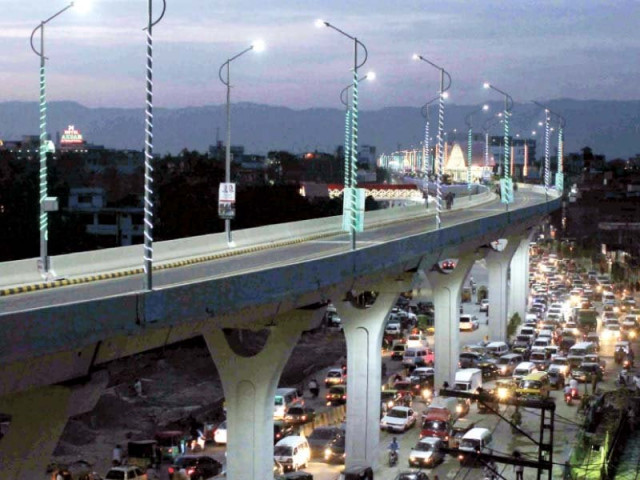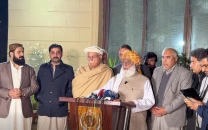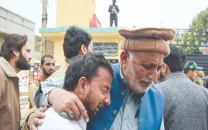Rawalpindi in review: New infrastructure does not address lingering issues
Provincial govt, city admin remain unsuccessful in initiating long-awaited projects

Issues like encroachment with the main artery of Rawalpindi, Muree Road, being blocked due to the construction of the Metro Bus Project engulfed the city during 2015. PHOTO: FILE
The year 2015 brought certain infrastructure improvements and public transportation facilities, yet the Punjab government and cantonment board authorities could not provide solutions to lingering the problems in the city, such as water scarcity, prevalent encroachments, and parking woes.
Prime Minister Nawaz Sharif inaugurated the multi-billion rupee metro bus project on June 4. The project has brought a healthy change in public transportation in the garrison city, where there has been no major bus transportation for commuters.
Residents of the city have welcomed the project, which has facilitated hundreds of thousands of commuters travelling between the twin cities.
The Punjab government and the city district management, however, have remained unsuccessful in initiating long-awaited projects to overcome water shortages in Rawalpindi. Residents have long been hearing about projects such as the Chirrah Dam, Daducha Dam, and Murree Bulk Water Supply, but with no tangible results.
According to some critics, the provincial government should have addressed the issue of water shortage instead of constructing the metro bus route.
Authorities in the Rawalpindi Cantonment Board (RCB) started a food street on Bank Road in Saddar, at the coast of Rs22.5 million on June 27. The facility may be a good entertainment place for residents of the cantonment, but authorities have overlooked the major issue of parking in Saddar.
The RCB announced the construction of three parking plazas to end parking woes, but could not start the project due to an apparent shortage of financial resources.
The Election Commission of Pakistan conducted local government elections on April 25 in the cantonment areas of Rawalpindi after many years. The elected representatives however are reportedly struggling to obtain their powers.
The LG election in rural and urban areas of Rawalpindi on December 5 was a positive step towards decentralisation of power. The process has however not yet been completed.
Further, the Punjab government failed to make progress on the Ring Road project, to ease congestion on city roads. The provincial government was also unable to introduce new projects related to public healthcare and education in Rawalpindi.
As far as the law and order situation is concerned, residents of Rawalpindi faced a suicide attack in the city on January 9. The blast, outside Imambargah Aun Muhammad Rizvi in Chittian Hattian, left eight people dead and 16 injured. The suicide bomber tried to enter the imambargah where celebrations for Eid Milad were under way.
On August 5, unknown gunmen shot dead Additional District and Sessions Judge Tahir Khan Niazi outside his official residence in Sadiqabad. The police later said that the killers were actually robbers, and they had intended to rob the judge’s house.
On October 15, an anti-terrorism squad gunned down three terrorists, including a woman, after raiding their hideout in Dhamial. The three were allegedly involved in the attack on former Punjab Home Minister Col (retd) Shuja Khanzada. During the operation, a sub inspector of the Punjab Elite Force was also killed.
Published in The Express Tribune, January 3rd, 2016.



















COMMENTS
Comments are moderated and generally will be posted if they are on-topic and not abusive.
For more information, please see our Comments FAQ